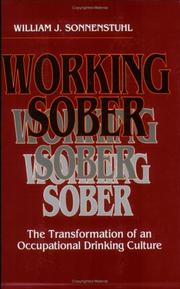| Listing 1 - 10 of 11 | << page >> |
Sort by
|

ISBN: 1501711210 9781501711213 0801432677 9780801432675 0801483484 9780801483486 Year: 2018 Publisher: Ithaca, NY : Cornell University Press,
Abstract | Keywords | Export | Availability | Bookmark
 Loading...
Loading...Choose an application
- Reference Manager
- EndNote
- RefWorks (Direct export to RefWorks)
Americans assume that workers do not drink on the job and that, if they do, it is because they suffer from alcoholism rather than because they are conforming to occupational expectations. William J. Sonnenstuhl disagrees. He contends that some occupational cultures encourage heavy drinking. Moreover, his research suggests that the sense of community which motivates drinking can also sometimes inspire workers to break the pattern and work sober.Revised and updated, this report addresses questions often raised by employers and union leaders developing job-based programs to help alcoholic and other troubled employees. This new edition discusses the efforts of EAP workers, the historical development and key components of EAPs, and the importance of balance in program strategies and in corporate and union responsibilities.
Drinking of alcoholic beverages --- Group identity --- Sandhogs --- Alcoholism and employment --- Alcohol consumption --- Alcohol drinking --- Alcohol use --- Alcoholic beverage consumption --- Consumption of alcoholic beverages --- Drinking problem --- Liquor problem --- Social drinking --- Alcoholic beverages --- Alcoholism --- Temperance --- Collective identity --- Community identity --- Cultural identity --- Social identity --- Identity (Psychology) --- Social psychology --- Collective memory --- Employment and alcoholism --- Personnel management --- Employee assistance programs --- Social aspects
Book
ISBN: 9781501744853 Year: 2019 Publisher: Ithaca, NY
Abstract | Keywords | Export | Availability | Bookmark
 Loading...
Loading...Choose an application
- Reference Manager
- EndNote
- RefWorks (Direct export to RefWorks)
Multi
ISBN: 9781501711213 Year: 2018 Publisher: Ithaca, N.Y. Cornell University Press
Abstract | Keywords | Export | Availability | Bookmark
 Loading...
Loading...Choose an application
- Reference Manager
- EndNote
- RefWorks (Direct export to RefWorks)
Multi
ISBN: 9781501744853 Year: 2019 Publisher: Ithaca, N.Y. Cornell University Press
Abstract | Keywords | Export | Availability | Bookmark
 Loading...
Loading...Choose an application
- Reference Manager
- EndNote
- RefWorks (Direct export to RefWorks)

ISBN: 0875461190 0875461204 1501744852 Year: 1986 Publisher: Cornell University Press
Abstract | Keywords | Export | Availability | Bookmark
 Loading...
Loading...Choose an application
- Reference Manager
- EndNote
- RefWorks (Direct export to RefWorks)

ISBN: 1501717898 9781501717895 0875461670 Year: 2018 Publisher: Ithaca : Baltimore, Md. : Cornell University Press, Project MUSE,
Abstract | Keywords | Export | Availability | Bookmark
 Loading...
Loading...Choose an application
- Reference Manager
- EndNote
- RefWorks (Direct export to RefWorks)
This Key Issues report addresses questions often raised by employers and union leaders setting out to develop job-based programs to help alcoholic and other troubled employees.Following chapters on the historical development and key components of EAPs, the authors discuss the importance of balance in program strategies and in corporate and union responsibilities. The authors also present examples to show the role EAPs might play when the problems of alcoholic and other troubled employees lead to arbitration and workers' compensation cases. The focus in the concluding chapter is on the future of EAPs—the need for more research and further development of educational programs for EAP practitioners.
Employee assistance programs. --- Alcoholism and employment. --- BUSINESS & ECONOMICS / Labor. --- Employment and alcoholism --- Personnel management --- Employee assistance programs --- Behavioral assistance programs --- Troubled employee programs --- Alcoholism and employment --- Drugs and employment

ISBN: 0762301805 Year: 1998 Publisher: Greenwich (Conn.) : Jai press,
Abstract | Keywords | Export | Availability | Bookmark
 Loading...
Loading...Choose an application
- Reference Manager
- EndNote
- RefWorks (Direct export to RefWorks)
Multi
ISBN: 9781501717895 Year: 2018 Publisher: Ithaca, N.Y. Cornell University Press
Abstract | Keywords | Export | Availability | Bookmark
 Loading...
Loading...Choose an application
- Reference Manager
- EndNote
- RefWorks (Direct export to RefWorks)

ISBN: 080143842X 080148734X 1501720783 Year: 2001 Publisher: Ithaca ILR Press
Abstract | Keywords | Export | Availability | Bookmark
 Loading...
Loading...Choose an application
- Reference Manager
- EndNote
- RefWorks (Direct export to RefWorks)
Book
ISBN: 9781501720789 Year: 2018 Publisher: Ithaca, NY
Abstract | Keywords | Export | Availability | Bookmark
 Loading...
Loading...Choose an application
- Reference Manager
- EndNote
- RefWorks (Direct export to RefWorks)
| Listing 1 - 10 of 11 | << page >> |
Sort by
|

 Search
Search Feedback
Feedback About UniCat
About UniCat  Help
Help News
News